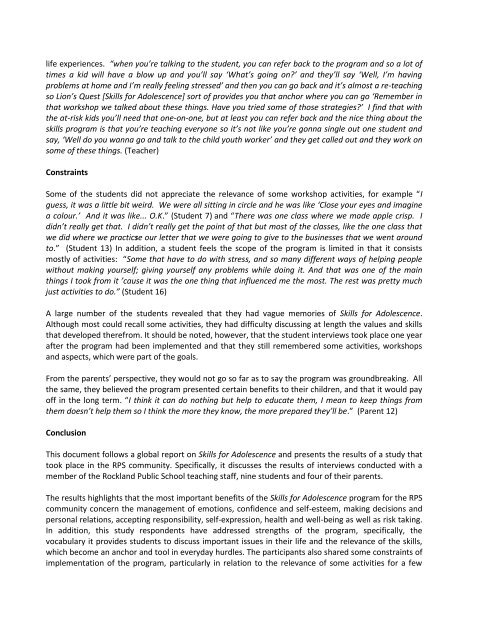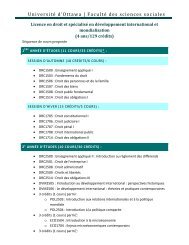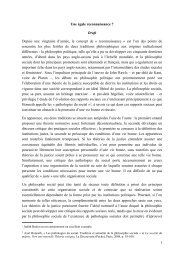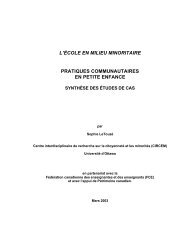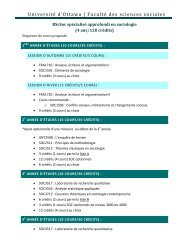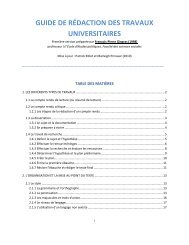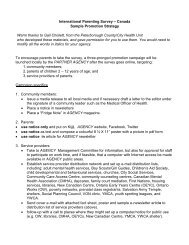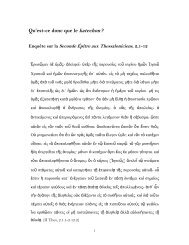Les Clés pour l'adolescence, un programme de promotion de la ...
Les Clés pour l'adolescence, un programme de promotion de la ...
Les Clés pour l'adolescence, un programme de promotion de la ...
You also want an ePaper? Increase the reach of your titles
YUMPU automatically turns print PDFs into web optimized ePapers that Google loves.
life experiences. “when you’re talking to the stu<strong>de</strong>nt, you can refer back to the program and so a lot of<br />
times a kid will have a blow up and you’ll say ‘What’s going on?’ and they’ll say ‘Well, I’m having<br />
problems at home and I’m really feeling stressed’ and then you can go back and it’s almost a re-teaching<br />
so Lion’s Quest [Skills for Adolescence] sort of provi<strong>de</strong>s you that anchor where you can go ‘Remember in<br />
that workshop we talked about these things. Have you tried some of those strategies?’ I find that with<br />
the at-risk kids you’ll need that one-on-one, but at least you can refer back and the nice thing about the<br />
skills program is that you’re teaching everyone so it’s not like you’re gonna single out one stu<strong>de</strong>nt and<br />
say, ‘Well do you wanna go and talk to the child youth worker’ and they get called out and they work on<br />
some of these things. (Teacher)<br />
Constraints<br />
Some of the stu<strong>de</strong>nts did not appreciate the relevance of some workshop activities, for example “I<br />
guess, it was a little bit weird. We were all sitting in circle and he was like ‘Close your eyes and imagine<br />
a colour.’ And it was like... O.K.” (Stu<strong>de</strong>nt 7) and “There was one c<strong>la</strong>ss where we ma<strong>de</strong> apple crisp. I<br />
didn’t really get that. I didn’t really get the point of that but most of the c<strong>la</strong>sses, like the one c<strong>la</strong>ss that<br />
we did where we practicse our letter that we were going to give to the businesses that we went aro<strong>un</strong>d<br />
to.” (Stu<strong>de</strong>nt 13) In addition, a stu<strong>de</strong>nt feels the scope of the program is limited in that it consists<br />
mostly of activities: “Some that have to do with stress, and so many different ways of helping people<br />
without making yourself; giving yourself any problems while doing it. And that was one of the main<br />
things I took from it ’cause it was the one thing that influenced me the most. The rest was pretty much<br />
just activities to do.” (Stu<strong>de</strong>nt 16)<br />
A <strong>la</strong>rge number of the stu<strong>de</strong>nts revealed that they had vague memories of Skills for Adolescence.<br />
Although most could recall some activities, they had difficulty discussing at length the values and skills<br />
that <strong>de</strong>veloped therefrom. It should be noted, however, that the stu<strong>de</strong>nt interviews took p<strong>la</strong>ce one year<br />
after the program had been implemented and that they still remembered some activities, workshops<br />
and aspects, which were part of the goals.<br />
From the parents’ perspective, they would not go so far as to say the program was gro<strong>un</strong>dbreaking. All<br />
the same, they believed the program presented certain benefits to their children, and that it would pay<br />
off in the long term. “I think it can do nothing but help to educate them, I mean to keep things from<br />
them doesn’t help them so I think the more they know, the more prepared they’ll be.” (Parent 12)<br />
Conclusion<br />
This document follows a global report on Skills for Adolescence and presents the results of a study that<br />
took p<strong>la</strong>ce in the RPS comm<strong>un</strong>ity. Specifically, it discusses the results of interviews conducted with a<br />
member of the Rock<strong>la</strong>nd Public School teaching staff, nine stu<strong>de</strong>nts and four of their parents.<br />
The results highlights that the most important benefits of the Skills for Adolescence program for the RPS<br />
comm<strong>un</strong>ity concern the management of emotions, confi<strong>de</strong>nce and self-esteem, making <strong>de</strong>cisions and<br />
personal re<strong>la</strong>tions, accepting responsibility, self-expression, health and well-being as well as risk taking.<br />
In addition, this study respon<strong>de</strong>nts have addressed strengths of the program, specifically, the<br />
vocabu<strong>la</strong>ry it provi<strong>de</strong>s stu<strong>de</strong>nts to discuss important issues in their life and the relevance of the skills,<br />
which become an anchor and tool in everyday hurdles. The participants also shared some constraints of<br />
implementation of the program, particu<strong>la</strong>rly in re<strong>la</strong>tion to the relevance of some activities for a few


